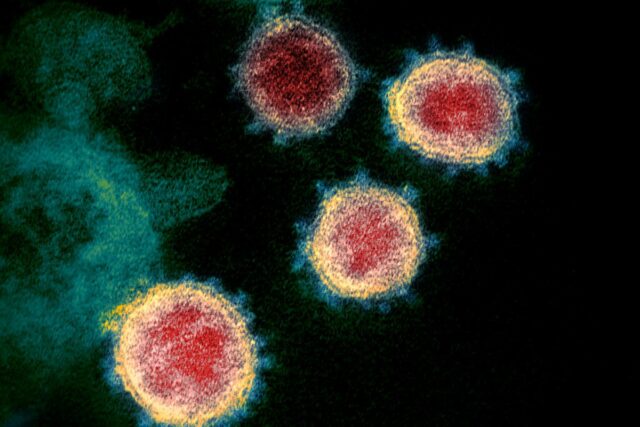The World Health Organization (WHO) designated a novel SARS-CoV-2 variant presently circulating in South Africa as a ‘variant of concern’ on Friday. It was also given the name Omicron.
The mutation was discovered on Monday by the Network for Genomics Surveillance in South Africa (NGS-SA). It had discovered a cluster of SARS-CoV-2 viruses that belonged to the B.1.1.529 lineage.
What Do We Know Of the Virus

As SARS-CoV-2 spreads, new variants occur, and the significance of each mutation is discovered after some time. However, health authorities around the world must keep a close eye on which ones are more vital than others. The NGS-SA discovered B.1.1.529 as part of such an experiment.
B.1.1.529 has several spike protein mutations, according to what is currently known, and a preliminary study suggests it is highly contagious. Over the previous two weeks, South Africa has seen a four-fold spike in new cases, corresponding with the appearance of B.1.1.529.
B.1.1.529 has rapidly expanded in Gauteng province, which contains Johannesburg and Pretoria, according to the NGS-SA, and may already be present in most provinces. Cluster outbreaks, according to the NGS-SA, may be behind the ongoing increase in cases.
Characteristics Of The Mutation
The new variety B.1.1.529 has “quite odd constellations of mutations,” according to the NGS-SA, with 30 in the region that encodes the spike protein, which is important for the virus’s entry into human cells.
Some of the alterations are well-characterized, having a known phenotypic influence on transmissibility and immune evasion, according to the study. In the Alpha and Delta forms, some of these mutations have already been discovered.
Many other mutations, however, have been “rarely found till recently and not adequately defined,” according to the NGS-SA. As a result, the full relevance of these alterations is unknown at this time.
“More research is being conducted to identify the potential influence of these alterations on the virus’s ability to spread more effectively, to impair vaccination effectiveness and dodge immune response, and/or to produce more severe or mild sickness,” the Africa Centers for Disease Control (CDC) stated.
Also Read: Countries Where COVID-19 Is Back
What Did The WHO Say:
- To combat the spread of the novel viral variant, the WHO has recommended a number of priority actions for member nations, including increased surveillance and sequencing efforts and widespread adoption of Thermo Fisher Scientific Inc.’s PCR test to detect the variant.
- In addition to increased surveillance and sequencing efforts, the UN health agency has recommended field research and laboratory analyses to better understand Omicron’s properties.
- Because Omicron is indicated by S gene target failure (SGTF) from a commonly used PCR test, the SGTF can be utilized as a marker for this variant, potentially leading to efficient detection of the variant of concern.
- Initial cases/clusters related to Omicron should be reported to WHO, as well as the percentage of Omicron in sequenced samples. Increase immunization coverage of Covid-19 as soon as possible.
- To change foreign travel measures in a timely manner, a risk-based strategy is used. For more information, the WHO has advised checking its upcoming guidelines on international traffic in relation to the SARS-CoV-2 Omicron strain.
What to Expect From 2022?
As most schools were reopening, and the world was gradually coming back to its original pre-covid pace, we actually hoped that COVID was something of the past now.
Experts believe that the world cannot and should not open in the year 2022, no matter how much crisis it pushes us towards. An economic crisis is right beyond the horizon, along with another year of academic breakdown.
However, BioNTech has already started working on an Omicron version of their COVID Vaccine, and things do not look as bleak as they sound. If we are careful, things are going to be fine. Because, better late than never, right?
Someday we will throw our masks in the air like graduation hats. Someday. But not today. Today we care for one another and stay safe.
Image Sources: Google Images
Sources: CNBC, Hindustan Times, Mint
Connect with the Blogger: Debanjan Dasgupta
This post is tagged under: pandemic, lockdowns, travel restrictions, COVID-19, South Africa, Omicron, World Health Organization (WHO), Alpha, Delta, Centre for Epidemic Response and Innovation, new strain, Austria, Italy, unvaccinated, Americans, Denmark, Germany, Britain, Czech Republic, Portugal, total nationwide lockdown, vaccination drive, public health measures, health infrastructure, genomic surveillance, vaccinate, second dose, COVID-19 deaths, a mutant variant, rapid transmission, increased severity of disease, SARS-CoV-2 Omicron strain, B.1.1.529, NGS-SA, Africa Centers for Disease Control (CDC), Dr Tedros Adhanom, United Nations (UN), Johannesburg, Pretoria, Gauteng province, Pfizer-BioNTech
Also Recommended:
ResearchED: How COVID-19 Vaccine Shots Can Potentially Benefit Mental Health